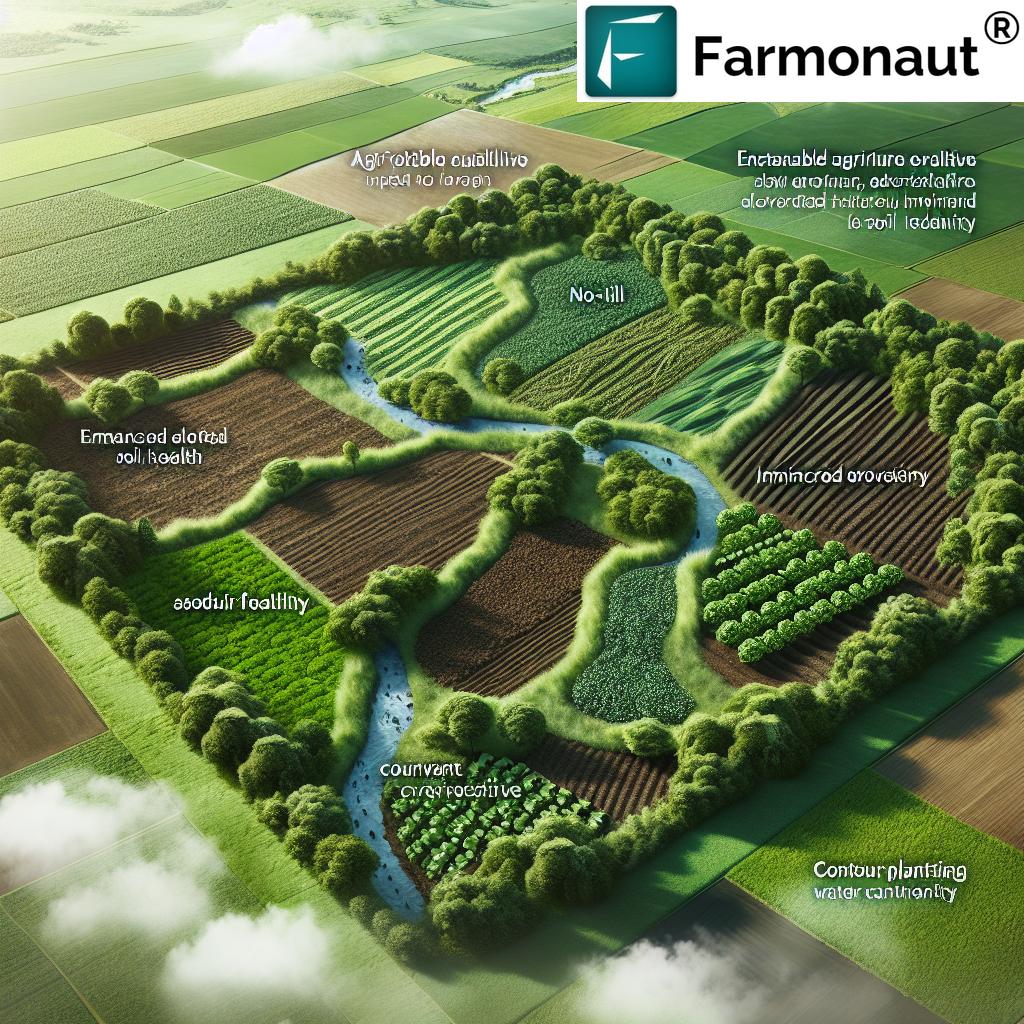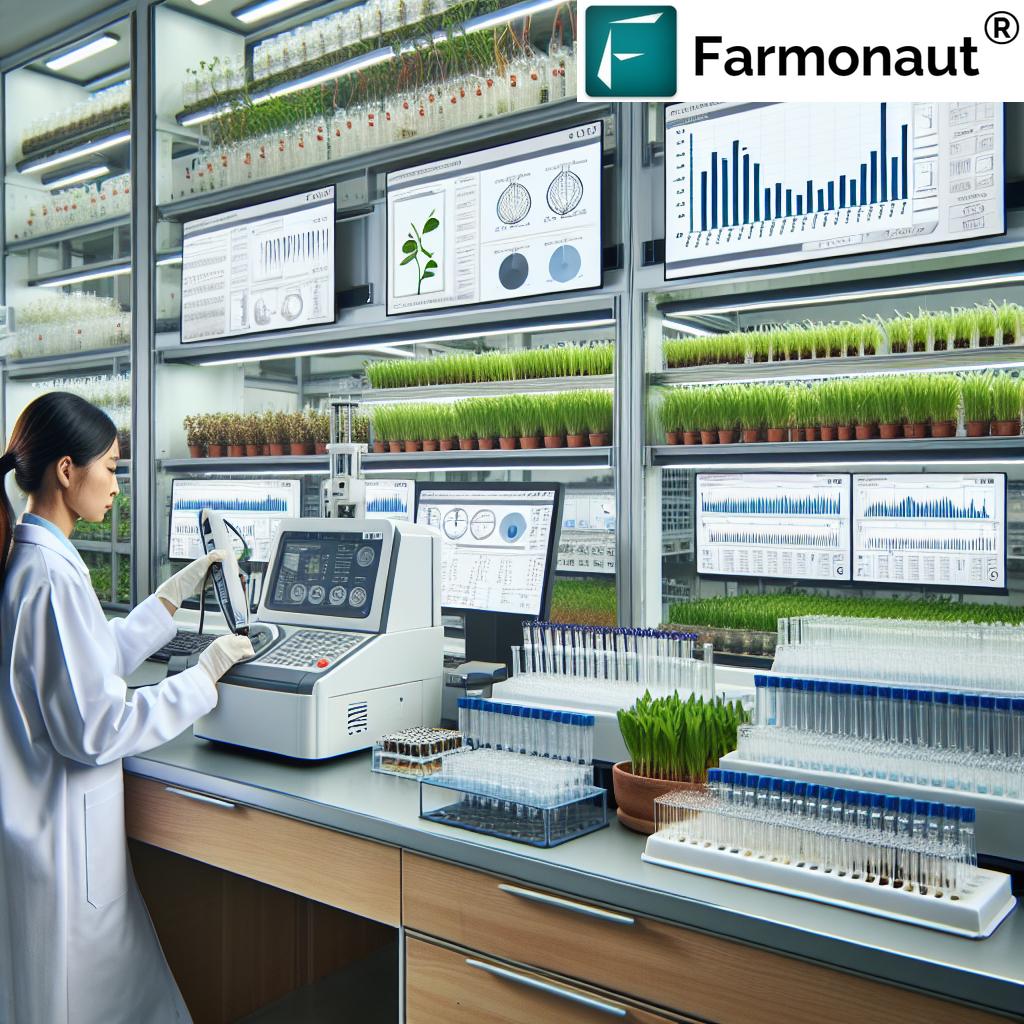Table of Contents
- Introduction: Cow Manure Soil in Agriculture 2025
- Trivia: Cow Manure Soil Organic Matter Impact
- The Role of Cow Manure in Soil Fertility & Crop Productivity
- Composting Cow Manure: Enhancing Soil Health & Practices
- Cow Manure & Compost Soil Uses: Agricultural & Environmental Applications
- Technological Advancements & Precision Management in 2025
- Comparative Benefits Table: Cow Manure, Compost, & Chemical Fertilizer
- Trivia: Yield Boost from Composted Cow Manure
- Farmonaut Support: Advanced Satellite Tools for Sustainable Agriculture
- Frequently Asked Questions
- Conclusion: Organic Solutions for a Regenerative Future
- Farmonaut Subscriptions
Cow Manure Soil & Compost Uses for Farming 2025: Sustainable Fertility, Soil Health & Productivity
In the evolving landscape of agriculture, the quest for sustainable, environmentally responsible, and highly productive farming systems has never been more urgent. As we approach 2025, cow manure soil, cow manure and compost soil have emerged as vital resources enhancing fertility, crop productivity, and environmental health. Integrating these organic materials as part of holistic soil management practices offers unmatched benefits for fields, farms, and the planet.
The Role of Cow Manure in Soil Fertility & Productivity (Focus Keyword: Cow Manure Soil)
Cow manure soil as a natural amendment brings unparalleled value in the quest for resilient and sustainable agriculture. In 2025, more farmers, agronomists, and researchers embrace the practical uses of cow manure and compost soil to improve soil fertility, boost crop yields, and nurture environmental health:
- Rich Organic Content: Cow manure is composed of decomposed plant material and livestock waste, supplying biologically rich organic matter and essential elements, including nitrogen, phosphorus, potassium, and micronutrients.
- Enhances Soil Structure: The presence of manure improves soil structure, boosting aeration, water retention, and infiltration in all soil types—critical in combating soil degradation and increasing resilience during drought periods.
- Supports Microbial Activity: With its high organic matter content, cow manure introduces and feeds beneficial microbes to the soil ecosystem, accelerating nutrient cycling and the breakdown of complex organic compounds into plant-available nutrients.
- Reduces Chemical Input Dependency: Unlike synthetic fertilizers, which often cause rapid nutrient leaching and groundwater contamination, cow manure soil gradually releases nutrients for sustained crop growth, reducing pollution risks.
- Facilitates Regenerative Practices: Integrating manure as an organic amendment supports crop rotation, intercropping, and cover cropping systems—core tenets of regenerative and climate-smart agriculture.
With global demands for food on the rise and an urgency to intensify sustainable practices, cow manure and compost soil are critical for replenishing depleted soils—helping farmland recover from intensive cultivation.
How Cow Manure Soil Enhances Soil Health
- Organic matter in manure holds water like a sponge, enhancing water retention—vital in drought-prone areas.
- Manure application increases soil microbial diversity and activity for improved nutrient cycling.
- Slow-release nutrients reduce runoff risk, protecting water bodies and aquifers from pollution.
- Boosts soil fertility over multiple cropping cycles, giving sustained crop productivity and resilience.
Farmonaut’s advanced remote sensing tools can provide real-time satellite imagery and AI-powered analytics to map soil health changes after manure application, track crop response, and optimize field strategies. To strengthen your soil management, access Farmonaut’s carbon footprinting platform for actionable insights on emissions, regenerative farming, and sustainability improvements.
Key Takeaway:
The use of cow manure and compost soil is not just a traditional practice but a sustainable, organic solution to modern farming challenges. Its contribution to fertility, nutrient cycling, and improved crop productivity remains unmatched for the future of agriculture.
Composting Cow Manure: How Composting Improves Soil Health & Farming Outcomes
Raw manure application—directly spreading cow excrement onto fields—can present challenges, including the spread of pathogens, weed seeds, and fertilizer burn from ammonium compounds. Hence, composting is the practical, eco-friendly step for every modern farm.
Composting cow manure is an aerobic, thermally stabilizing process that transforms raw manure into rich, humified compost—often referred to as cow manure and compost soil. This process mitigates the risks associated with raw manure, concentrates nutrients, and enriches the amendment with beneficial microorganisms.
Benefits of Using Composted Cow Manure Soil (Focus Keyword: Cow Manure and Compost Soil)
- Sanitized Material: High temperatures during composting destroy weed seeds and pathogens, making the compost safe for food crops and protecting human health.
- Concentrated Nutrient Profile: The composting process reduces bulk but concentrates essential nutrients, improving the amendment’s effectiveness.
- Enriched Microbial Content: Finished compost is teeming with beneficial microbes, further enhancing soil biological activity and resilience.
- Stable Humus Formation: The transformation of simple organic compounds into stable humus supports long-term soil fertility and structure.
- Promotes Carbon Sequestration: Composted cow manure adds organic carbon to the soil, supporting carbon credit systems and reducing agriculture’s carbon footprint in 2025 and beyond.
- Reduces Risk of Nutrient Loss: Compared to synthetic fertilizers, composted manure presents a slower, consistent nutrient release, minimizing nitrate leaching and runoff.
How to Compost Cow Manure for Agricultural Use (2025-Ready)
- Collect Manure: Gather cow manure and bedding material such as straw or sawdust for carbon balance.
- Establish a Compost Pile: Use a well-drained site. Mix manure and bedding to maintain 30:1 carbon-to-nitrogen (C:N) ratio.
- Moisture & Aeration: Keep the pile moist but not soggy. Turn regularly for even aeration and decomposition.
- Monitor Temperature: Ensure compost heats to 55-65°C (131-149°F) for pathogen and weed seed destruction.
- Cure & Mature: Allow the compost to ‘cure’ for several weeks to stabilize the material before field application.
For in-field optimization, satellite monitoring and AI advisory systems—like those provided by Farmonaut—help evaluate compost effectiveness, monitor soil health changes, and guide precise application for maximum crop benefit.
Cow Manure & Compost Soil Uses: Agricultural & Environmental Applications
The utility of cow manure soil and composted manure extends far beyond basic fertilizer:
- Soil Conditioner: Regularly applied, manure maintains soil fertility, corrects texture, and combats erosion—vital for both arable and horticultural farms.
- Biofertilizer and Vermicomposting: Cow manure serves as a core substrate for vermicomposting; earthworm activity further enhances microbial diversity and nutrient value.
- Biogas Production: Anaerobic digesters use cow manure to generate renewable biogas, producing clean energy and leaving behind nutrient-rich slurry usable as fertilizer.
- Silviculture & Forestry: Applying manure and compost soil fosters healthier tree seedlings, supports afforestation, and improves soil reserves amid climate adaptation programs.
- Integrated Farming Systems: On diversified farms, manure cycles as part of a closed-loop system, integrating livestock, cropping, and even aquaculture for resource efficiency and reduced waste.
- Greenhouse and Urban Agriculture: Urban farmers increasingly use composted manure for container gardening, rooftop farming, and community gardens due to its low cost and pollution mitigation.
For operations aiming to scale their input management, Farmonaut’s large-scale farm management platform offers comprehensive satellite-driven decision support and resource tracking so farms can manage organic amendments efficiently and profitably.
Environmental and Climate Impacts: Carbon, Pollution, and Ecosystem Health
- Carbon Sequestration: Manure-based amendments add stable carbon to soil, mitigating atmospheric CO2 and helping farmers access carbon credit markets.
- Reduces Chemical Dependency: Manure and compost decrease the need for synthetic fertilizers, minimizing nitrous oxide emissions and chemical pollution.
- Restores Soil and Water: Regular applications buffer against land degradation, fight desertification, and recharge groundwater by improving infiltration.
Proper record-keeping of carbon and manure application—facilitated by digital platforms like Farmonaut Carbon Footprinting—helps quantify climate impacts and support compliance for emerging sustainability standards in 2025.
Technological Advancements in Manure Management: Precision Applications for Soil Health in 2025
The advent of precision agriculture in 2025 brings a paradigm shift to how manure and compost are integrated into soil management strategies:
- GPS-Guided Application: Enables uniform, data-driven manure spreading, targeting nutrient-deficient areas of fields and reducing over-application risks.
- Remote Sensing & Crop Health Mapping: Tools like the Farmonaut Satellite Platform provide high-resolution NDVI and soil moisture analytics, pre- and post-application, to measure soil and crop response to amendments.
- Nutrient Management Plans: Map-based nutrient audits and AI-calculated prescriptions support precise application amounts, timing, and integration with crop rotation schedules.
- Blockchain-Enabled Traceability: With Farmonaut’s traceability platform, organic produce fertilized with composted cow manure can be authentically traced from field to consumer, opening premium markets and strengthening environmental claims.
Sustainable effectiveness of cow manure and compost soil is further validated by on-the-ground results and digital verification, creating a transparent, compliant cycle for modern farming systems.
Digital Transformation in Farm Management
Tools like Farmonaut’s Crop Plantation/Farm Advisory integrate manure application records with satellite-driven weather forecasts and crop advisories for optimized planning. APIs (see API, Developer Docs) offer seamless data integration for smart farm management platforms.
Comparative Benefits Table: Cow Manure Soil, Compost, and Chemical Fertilizer (Keyword: Cow Manure Soil)
| Input Type | Estimated NPK Content (%) | Soil Organic Matter (%) | Yield Increase (%) | Cost Estimate ($/acre) | Carbon Footprint (kg CO2/acre) |
|---|---|---|---|---|---|
| Cow Manure (Raw) | 0.9-0.5-0.7 | +18% | 12–15% | 30–45 | ~40 |
| Compost (Cow Manure) | 1.5-1.0-1.3 | +25–28% | 20–23% | 45–70 | ~20 |
| Chemical Fertilizer | 20-20-20 (variable) | 0-2% | 13–15% | 65–120 | ~180 |
*Figures are indicative averages for typical input rates and may vary with region, crop, and application system.
Farmonaut Support: Satellite & AI Technologies Empowering Organic Farm Management
As sustainability becomes a priority, technological integration is essential for measurable progress. We, at Farmonaut, are committed to making satellite-driven insights, AI-powered advisory, and blockchain traceability affordable and accessible to every farm—big or small. Our platform supports the entire spectrum of organic manure application and compost strategies, driving soil health, productivity, and eco-certification in 2025.
Key Features for Cow Manure Soil & Compost Management:
- Satellite-Based Soil Monitoring: High-definition NDVI, soil moisture, and temperature analytics to track responses after manure or compost application.
- Real-Time AI Advisory: Jeevn AI delivers weather forecasts, crop health tips, and application timing to maximize manure utility and crop yield.
- Traceability: Blockchain integration records application events, compliance, and organic certification transparently from field to market (See: Product Traceability).
- Environmental Impact Measurement: Carbon footprinting tools evaluate emissions impact of fertilizer strategies—vital for climate-smart farming (Carbon Footprinting).
- Integrated Resource Management: Fleet and asset tracking tools (Fleet Management) ensure efficient logistics of manure and compost transport/application.
- Mobile & API Access: Full platform available via Web App, Android, iOS. Developers can utilize APIs to integrate our satellite insights into custom farm-management software.
Our subscription services fit all scales—from field-level organic management to large-scale enterprise digitalization. With climate, compliance, and cost under control, organic amendments such as cow manure and compost soil are easier to implement, track, and monetize than ever before.
Frequently Asked Questions: Cow Manure Soil & Compost Uses in 2025
1. What nutrients does cow manure soil provide compared to chemical fertilizers?
Cow manure soil provides slower-release forms of nitrogen, phosphorus, potassium and a spectrum of micronutrients, plus valuable organic matter. While chemical fertilizers have higher immediate NPK, manure supports longer soil health, microbial activity, and structure, making it a superior regenerative amendment for fields in 2025.
2. Is composted cow manure safe for edible crops?
Yes. Composted manure undergoes high temperatures that sanitize the material—destroying weed seeds and pathogens. Always follow recommended composting procedures to ensure safety and compliance for fresh produce in agriculture.
3. How much cow manure or compost should I apply per acre?
This depends on soil status, crop requirements, and local regulations. Generally, 8–15 tons of raw manure or 4–8 tons of composted manure per acre can significantly increase organic matter and nutrient content without risk of over-fertilization or pollution.
4. Can I use manure for crop rotation and intercropping systems?
Absolutely. Manure and compost are ideal for rotation and intercropping; their slow-release nutrients benefit both main and secondary crops and improve soil over multi-year cycles. They are highly compatible with organic, intercropped, and conservation agriculture.
5. What environmental benefits does manure use offer in 2025?
Cow manure soil and compost contribute to carbon sequestration, reduce chemical input dependency, restore degraded soils, and improve water retention, supporting climate-resilient food systems in line with 2025 sustainability goals.
6. How can I digitally monitor and optimize my manure application?
With Farmonaut’s satellite-driven tools, users can analyze crop growth, soil health, and application efficacy from their browser or smartphone. Farmers can also leverage blockchain for proof of sustainable practices and access premium or certified-organic markets.
Conclusion: Organic Solutions for a Regenerative Agricultural Future
As the world transitions into 2025 and beyond, cow manure soil and cow manure and compost soil remain foundational pillars for sustainable, productive agriculture. Their integration enhances soil fertility, improves crop yields, promotes regenerative practices, and supports vital ecosystem functions—simultaneously reducing carbon emissions and dependence on synthetic inputs. Modern technological advancements, from satellite imagery to AI-managed soil systems, further amplify their benefits while ensuring traceability, compliance, and long-term planetary health.
If you are planning to integrate organic amendments into your farming strategy for 2025, leverage digital tools, track your carbon savings, and consult with experts. To start your digital journey, access the Farmonaut Platform and elevate your farm’s productivity, sustainability, and resilience.
Farmonaut Subscriptions: Empower Your Farm Management
Choose from flexible, scale-appropriate subscription packages. Monitor soil health, track manure and compost application, optimize irrigation, and certify sustainability—directly from your device.
Ready to make your farm healthy, sustainable, and future-ready? Start your journey with farmonaut today.










